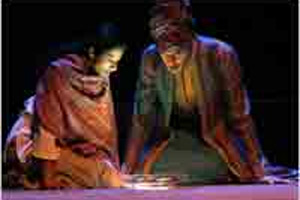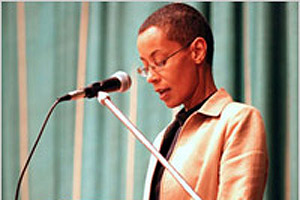Focus on America
Play About Persian Folk Tale Delights Young American Audiences

The Shakespeare Theatre Company of Washington, a showcase for the work of arguably the greatest writer in Western literature, has staged a children's play based on a Persian folk tale.
The Shakespeare Theatre Company of Washington, a showcase for the work of arguably the greatest writer in Western literature, has staged a childrens play based on a Persian folk tale.
Playwright Norman Allen, who teaches at a Washington charter school, said that the inspiration for the play, On the Eve of Friday Morning, lay in his frustration with hearing Iran described in broad, sweeping and dismissive language by many U.S. political figures. Certainly, many of the Iranian governments policies are deeply disturbing. But Iran used to be Persia, and the riches to be found in exploring Persian culture are boundless, he said.
Allens love of Persian folk literature spurred him to write a script based on the tale of the mythical Mushkil Gusha, the remover of obstacles. Mushkil Gushas booming voice is heard, but his presence is not seen as he transforms the lives of a poverty-stricken peasant, Baba Kharkan, and his daughter, Nassrin.
After providing the pair with food, Mushkil Gusha admonishes the father: Your fortunes are changing, Baba Kharkan. Every Thursday night, on the eve of Holy Friday, share some fruit and nuts as have been shared with you -- and tell the story of how Mushkil Gusha came into your life. Those who are in need will find their way.
Baba Kharkan and Nassrin are taken in as members of a royal court, where they live in luxury and forget Mushkil Gushas teachings about generosity. Eventually, they descend into poverty again.
Why did Allen choose to write a childrens play about this folk tale that nary a child in Washington outside the Iranian community had heard of?
The lesson of Mushkil Gusha is the same one that my mother taught me: if you receive a blessing, you must pass it on, he said.
Persia is a culture rich in colors, the poetry of Rumi, [stories of] epic battles and kingdoms usurped, and an overpowering architecture, Allen said. I wanted the audience to have an awareness of the differences and similarities to us. It is exotic, yet familiar. It opens with a girl doing her homework and calling on a cell phone.
David Muse, who directed the play, echoes Allen. The characters in this play are normal boys and girls and mothers and fathers. In todays world, a play that focuses on the common humanity that unites us rather than the differences that divide us is a rare thing.
Before plunging the young audience into the ancient Persian tale, the playwright establishes a modern connection between children in Iran and the United States. Nassrin sends a text message via cell phone. Then the story takes an abrupt turn into a chilling reality that pervades Iran and many non-democratic countries. Her father, an English teacher, has been arrested for smuggling banned books -- As I Lay Dying by Nobel Prize-winner William Faulkner, The DaVinci Code by Dan Brown and The Beatles Illustrated Lyrics, innocuous by Western standards and bewildering to Nassrin.
Books are banned here in Iran. Most of them are amazingly boring. Maybe thats why they e banned -- because they e so boring that no one can read them, she says in the play. But the girls bewilderment gives way to anguish at the fate of her father. To quell Nassrins fears and help her through the night, the girls mother tells her the story of Mushkil Gusha, one of the Stories of Power.
In a few moments, the lights change and the scene of a fear-stricken mother and daughter ensnared in the modern Iranian police state fades. On stage appear a 16-year-old Iranian American actor, Neema Atri, playing the role of the boy Bahad, and the celebrated Shakespearean actor Craig Wallace, portraying a wandering ancient Persian storyteller, a naqqal. At that moment, the children in the audience are transported back to ancient Persia, and the universal theme of generosity versus selfishness plays out.
For Atri, the chance to play the role of Bahad was a great opportunity. I love doing it for my family. It has enabled me to connect more with my parents, who were born in Iran and are very familiar with this story. I hope that this play will help people realize that life is three-dimensional, he said.
As to how On the Eve of Friday Morning played with the young theatergoers, 10-year-old Julia Berley jumped up and down and clapped excitedly as she spoke to a reporter. It was so funny. They are like us. They use cell phones too. It told us people have to share with each other, she said.
Her friend, 11-year-old Rebecca Berger, commented with remarkable poise: The play was very well thought out. It told us that we should think of others and that fortunes change.
Recently on Focus on America
Iraqi, American Poetry Reading Bridges Cultural Divides
 “One of the treasures of poetry is that it allows full equality to all artists and freedom of expression in what defines a truly democratic society,” said U.S. Ambassador to Iraq Ryan Crocker January 15 at the first annual Iraqi/American Poetry Reading, sponsored by the U.S. Embassy in Baghdad in partnership with the Iraqi Tawasin Cultural Society.
“One of the treasures of poetry is that it allows full equality to all artists and freedom of expression in what defines a truly democratic society,” said U.S. Ambassador to Iraq Ryan Crocker January 15 at the first annual Iraqi/American Poetry Reading, sponsored by the U.S. Embassy in Baghdad in partnership with the Iraqi Tawasin Cultural Society.
Innovative Use of Online Networks Transforming Society
 If you're going to keep up with Ben MacKrell, you'll need two things: a cell phone and an account at Facebook or a similar Web site that falls under the loose term "social networking."
If you're going to keep up with Ben MacKrell, you'll need two things: a cell phone and an account at Facebook or a similar Web site that falls under the loose term "social networking."
Young Innovator Profile: Michael Wong
 Describing his idea to use gold to clean up toxic waste, Michael Wong says, "I admit it does sound crazy." Wong plans to combine gold with palladium — an even more precious metal — to treat polluted groundwater beneath waste dumps and contaminated factories and military sites. "It not only works faster [than current methods], but a hundred times faster," Wong says, "and I bet it will be cheaper too."
Describing his idea to use gold to clean up toxic waste, Michael Wong says, "I admit it does sound crazy." Wong plans to combine gold with palladium — an even more precious metal — to treat polluted groundwater beneath waste dumps and contaminated factories and military sites. "It not only works faster [than current methods], but a hundred times faster," Wong says, "and I bet it will be cheaper too."